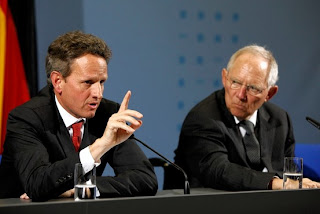Wednesday, 7 December 2011
Geithner: Europe 'Will Succeed'
U.S. Treasury Secretary Tim Geithner said Wednesday he was confident that the efforts made by European governments to tackle the current sovereign-debt crisis and the economic slowdown will be successful, after he met with French Finance Minister François Baroin.
"We're encouraged by the progress [Europeans] are making not just to put in place economic reforms across Europe to create the conditions for stronger growth in the future but to try build a stronger architecture for a fiscal union ... and ... try to make sure there's a sufficiently strong firewall in place to help support those efforts," Mr. Geithner said during a press conference.
"I am confident they will succeed," he said, adding he has "a lot of confidence in what the President of France [Nicolas Sarkozy] and what the minister [Mr. Baroin] are doing, working with Germany trying to build a stronger Europe."
Speaking during the same conference, Mr. Baroin said that the European governments are committed to do everything to ensure that the financial crisis ends and that there's a real economic recovery.
Mr. Geithner is on a three-day trip to Europe, appealing for stronger action as European leaders prepare to meet Thursday and Friday. He planned to meet later Wednesday morning with French President Nicolas Sarkozy.
On Tuesday, Mr. Geithner boosted pressure on European nations by appealing to euro-zone officials on for stronger action to calm the Continent's deepening debt turmoil. Mr. Geithner said the currency bloc will need "a sustained commitment of political will" to resolve its troubles.
He kicked off his visit by meeting in Frankfurt on Tuesday morning with the president of the European Central Bank and the head of Germany's central bank, and later, in Berlin, with Germany's finance minister. Mr. Geithner didn't disclose details of his discussions with the three officials, all of whom are central to devising more-decisive measures to resolve market fears that are weighing on the global economy.
"Financial crises are ultimately resolved when governments and central banks succeed in creating the conditions that make it compelling for investors to take the risks involved in lending to governments and to banks," Mr. Geithner said in Berlin after meeting with German Finance Minister Wolfgang Schäuble.
Mr. Geithner praised European officials for their latest steps, including budget overhauls in several countries and a move toward tighter budget-enforcement procedures.
Mr. Schäuble, in turn, acknowledged the shortcomings in the euro zone's existing arrangements and said officials understood the high expectations tied to the leaders' summit Thursday and Friday. "The objective is to send out a clear signal ... which will allow us to restore confidence" in markets, he said.
The Treasury secretary's visit underscores the Obama administration's worries that the worsening debt crisis threatens to depress an already weak global recovery. The latest tour marks Mr. Geithner's fifth trip to Europe in three months.
He arrived during a key week for the currency bloc, culminating in the leaders' summit. German Chancellor Angela Merkel and French President Nicolas Sarkozy on Monday proposed greater centralized control over European budgets as a critical step to restore investor confidence in euro-zone debt.
Euro-zone nations also have been negotiating an increase in the lending capacity of the currency bloc's bailout funds, the EFSF and its permanent successor, the European Stability Mechanism. One suggestion, in a report EU President Herman Van Rompuy sent to member states on Tuesday, is that the ESM "have the necessary features of a credit institution." It doesn't specify the features, but one might be access to financing from the ECB.
The U.S. has long pushed for the ECB to assume a bigger role as an emergency lender to euro-zone governments that are struggling with sharply-higher borrowing costs, such as those in Italy and Spain. Both Mario Draghi, the new head of the ECB, and Jens Weidmann, president of Germany's Bundesbank, have resisted, though Mr. Draghi signaled last week that the ECB could boost its efforts if euro-zone governments enacted stricter budget rules.
Mr. Geithner declined to respond to a question about his discussions with the central bankers. "I'm not going to speak to what the ECB should do or will do or can do," he said. "The ECB has been playing a central role in this crisis and is obviously going to continue." He has pushed for the ECB to stand behind the currency union more forcefully, much as the Federal Reserve backstopped financial firms during the U.S. crisis.
Obama administration officials have been talking frequently with euro-zone finance ministers throughout the European crisis to offer ideas about preventing deeper turmoil, invoking U.S. experiences with the 2008-09 financial crisis. Mr. Obama also has reached out regularly to European leaders, including Ms. Merkel and Mr. Sarkozy. But they are proceeding cautiously. Some Republicans have questioned the Obama administration's involvement in Europe's crisis, saying that domestic problems need more attention. At the same time, a handful of European nations have indicated resentment in recent months to pressure from the U.S., a country with its own troubles. Germany, the euro zone's largest and strongest member, has openly rejected Mr. Geithner's pleas for the ECB to take a larger role in supporting nations that have trouble borrowing at affordable rates.
Mr. Geithner said the U.S. would "continue to support a constructive role by the fund in the context of the efforts the Europeans are making to build a stronger Europe."
He disputed recent press reports that the Federal Reserve might contribute new money, alongside European central banks, to the IMF. U.S. officials also don't support deploying more American taxpayer funds to rescue Europe.
read more: Olympus Wealth Management
Subscribe to:
Post Comments (Atom)


No comments:
Post a Comment